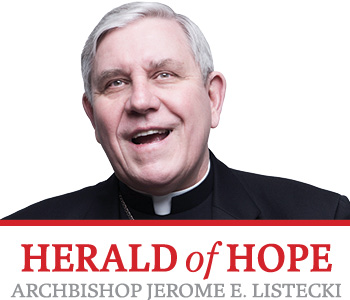ARCHBISHOP JEROME E. LISTECKI
Needless to say, this must be the strangest Holy Week that most of us have ever encountered. Rarely have we ever experienced a challenge that affects the entire nation as well as the entire globe.
This coronavirus has attacked the very way we live our lives, how we conduct our businesses and the way we meet socially, and has denied our recreational enjoyments. For the last few weeks, even attending daily and Sunday Masses at our churches, which normally would bring consolation, has been closed in order to ensure personal safety. Watching television does not seem to bring a sense of resolve but only seems to magnify the critical nature of the situation as we view the numbers rising like the temperature in the heat of the summer. Now we find ourselves during this Holy time, the Easter Triduum, reaching out to God and attempting through our faith to make sense of this pandemic.
Of course as a religious leader, I am sensitive to the various spiritual questions posed by good people who have been wounded by this virus. It appears that these questions are really ones that have been asked by all people of faith at various times in their personal lives but the difference is that we are experiencing this threat as a “collective;” our very humanity is confronted. What might God be saying to us at this time in our crisis?
A first insight that we might recognize because of this pandemic is our common humanity. Unfortunately in life, our differences are magnified: race, gender, age, education or economics. The virus is blind to differences. It attacks all of us. One of the beauties in the teachings of the Catholic Church is our sense of universality.
As a Church, we hold to the “Mystical Body;” we are one, holy, catholic and apostolic. We are one with our brothers and sisters throughout the world. We have been created “imago dei:” in the image of God. Perhaps God is assisting us in raising our consciousness of our common suffering and humanity. Having been a member of CRS (Catholic Relief Services), I have viewed firsthand the work of the Church in other nations. I know that during this pandemic they will represent us in their ministry to the needy. There are some places that will need the basics, food and water, just to survive. At the celebration of the Last Supper on Holy Thursday, Jesus washed the feet of His disciples demonstrating how we should serve others in his name. Service is a sign of charity as Christ loves us so we should love one another.
A second insight is our need to strengthen our faith. Rarely are we tested apart from our normal life experiences. When all of us must confront a common enemy then we seek answers together. At funerals, often a second reading from St. Paul’s letter to the Romans (8:31) will be proclaimed: “If God is for us who can be against us? He did not spare his own son but handed him over for us all, will he not also give us everything else along with him?”
We turn to God in prayer knowing that he hears the cries of his children. God will not abandon us. On Good Friday, he offered his son on the cross. We lift high the cross and venerate the sign of the cross because this divine self-giving reestablished the kingdom prepared for all believers from the beginning of the world. His suffering is our suffering and his death is our death. The cross states to all of us that God’s love has no limitations. Does our faith at this time resonate with St. Paul’s statement, which is nothing can separate us from the love of God in Christ Jesus our Lord?
A third insight is that “we need one another.” We have experienced various individuals in the medical profession and first responders who have courageously answered the call to serve, placing themselves at risk for the sake of their brothers and sisters. For those who have died and are in extreme medical conditions, these medical professionals become the family bringing comfort to those separated from their love ones.
Our first responders maintain social order to serve and protect, and those who operate essential services are there to dispense necessary supplies. We need one another and they need our prayers and appreciation. During the Easter Vigil, three elements are part of the service: light (fire), water and the word. A lit candle enters the church; it is the light of Christ, which illumines a darkened world and allows us to see.
During this time in our crisis, we are enlightened as we see those who serve others in love connected to God’s care for us. Water initiates us in the baptism joining us to Christ. Water is an ambiguous sign: it can be death or life. Remember, we cannot be conquered by the virus for if we die with Christ in the waters of baptism, we will rise with him to new life. And lastly, but most importantly, we have his word. It is the word of life. He has risen as he said Alleluia.
On Easter Sunday, usually churches are decorated, choirs sing and bells ring. It is a sign of the joy of the resurrection, which means death and sin have been defeated and all that is needed is our faith in the Lord. However, this Sunday we find ourselves outside the tomb wondering like Peter and John what does this empty tomb mean?
A final insight is our answer to the empty tomb. He is the hope of the world. He is our hope and with his love we shall overcome all adversities for his resurrection is our life forever in God’s Love. It is a Happy Easter for us all.
